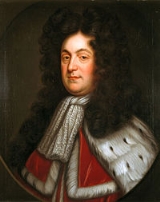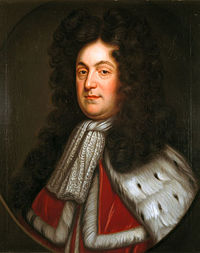
John Hamilton, 2nd Lord Belhaven and Stenton
Encyclopedia

He was the eldest son of Robert Hamilton, Lord Presmennan (d. 1696). Having married Margaret, granddaughter of John Hamilton, 1st Lord Belhaven and Stenton
John Hamilton, 1st Lord Belhaven and Stenton
John Hamilton, 1st Lord Belhaven and Stenton , known as Sir John Hamilton, 2nd Baronet from circa 1645 to 1647, was a Scottish peer....
; who had been made a peer by Charles I
Charles I of England
Charles I was King of England, King of Scotland, and King of Ireland from 27 March 1625 until his execution in 1649. Charles engaged in a struggle for power with the Parliament of England, attempting to obtain royal revenue whilst Parliament sought to curb his Royal prerogative which Charles...
in 1647, he succeeded to this title in 1679.
In 1681, he was imprisoned for opposing the government and for speaking slightingly of James, duke of York, afterwards James VII and II
James II of England
James II & VII was King of England and King of Ireland as James II and King of Scotland as James VII, from 6 February 1685. He was the last Catholic monarch to reign over the Kingdoms of England, Scotland, and Ireland...
, in parliament, and in 1689 he was among those who asked William of Orange
William III of England
William III & II was a sovereign Prince of Orange of the House of Orange-Nassau by birth. From 1672 he governed as Stadtholder William III of Orange over Holland, Zeeland, Utrecht, Guelders, and Overijssel of the Dutch Republic. From 1689 he reigned as William III over England and Ireland...
to undertake the government of Scotland
Scotland
Scotland is a country that is part of the United Kingdom. Occupying the northern third of the island of Great Britain, it shares a border with England to the south and is bounded by the North Sea to the east, the Atlantic Ocean to the north and west, and the North Channel and Irish Sea to the...
. Belhaven was at the Battle of Killiecrankie
Battle of Killiecrankie
-References:*Reid, Stuart, The Battle of Kiellliecrankkie -External links:* *...
in 1689. He was a member of the Scottish privy council
Privy Council of Scotland
The Privy Council of Scotland was a body that advised the King.In the range of its functions the council was often more important than the Estates in the running the country. Its registers include a wide range of material on the political, administrative, economic and social affairs of Scotland...
.
He was a director of and invested heavily in the Scottish Trading Company, which was formed in 1695 and was responsible for the ill-fated Darien scheme
Darién scheme
The Darién scheme was an unsuccessful attempt by the Kingdom of Scotland to become a world trading nation by establishing a colony called "New Caledonia" on the Isthmus of Panama in the late 1690s...
to set up a Scots colony on the Darien
Darien
Darien is a masculine name; variants include Darian and Darion. Darien may refer to:-Panama:*Darién Gap, border area between Panama and Colombia*Darién National Park*Darién Province*Gulf of Darién*Santa María la Antigua del Darién, town founded in 1510...
peninsula in Panama
Panama
Panama , officially the Republic of Panama , is the southernmost country of Central America. Situated on the isthmus connecting North and South America, it is bordered by Costa Rica to the northwest, Colombia to the southeast, the Caribbean Sea to the north and the Pacific Ocean to the south. The...
.
He was also a proponent of agricultural improvement publishing a handbook, The Countryman's Rudiments in 1699.
He favoured the agitation for securing greater liberty for his country, an agitation which culminated in the passing of the Act of Security in 1705, and he greatly disliked the union of the parliaments, a speech which he delivered against this proposal in November 1706 attracting much notice. He was, along with Andrew Fletcher of Saltoun, one of the most eloquent and inflammatory of politicians. Two of his speeches, one being the famous one of November 1706, were published in an appendix to Daniel Defoe
Daniel Defoe
Daniel Defoe , born Daniel Foe, was an English trader, writer, journalist, and pamphleteer, who gained fame for his novel Robinson Crusoe. Defoe is notable for being one of the earliest proponents of the novel, as he helped to popularise the form in Britain and along with others such as Richardson,...
's History of the Union (first printed in 1710).
Later he was imprisoned, ostensibly for favouring a projected French invasion, and he died in London on 21 June 1708.
Belhaven's son, John, who fought on the British Government
Kingdom of Great Britain
The former Kingdom of Great Britain, sometimes described as the 'United Kingdom of Great Britain', That the Two Kingdoms of Scotland and England, shall upon the 1st May next ensuing the date hereof, and forever after, be United into One Kingdom by the Name of GREAT BRITAIN. was a sovereign...
side at the Battle of Sheriffmuir
Battle of Sheriffmuir
The Battle of Sheriffmuir was an engagement in 1715 at the height of the Jacobite rebellion in England and Scotland.-History:John Erskine, 6th Earl of Mar, standard-bearer for the Jacobite cause in Scotland, mustered Highland chiefs, and on 6 September declared James Francis Edward Stuart as King...
, became the 3rd Lord on his father's death. He was drowned in November 1721, whilst proceeding to take up his duties as governor of Barbados
Barbados
Barbados is an island country in the Lesser Antilles. It is in length and as much as in width, amounting to . It is situated in the western area of the North Atlantic and 100 kilometres east of the Windward Islands and the Caribbean Sea; therein, it is about east of the islands of Saint...
, and was succeeded by his son John (d. 1764).
After the death of John's brother James in 1777 the title was for a time dormant; then in 1799 the House of Lords
House of Lords
The House of Lords is the upper house of the Parliament of the United Kingdom. Like the House of Commons, it meets in the Palace of Westminster....
declared that William Hamilton (1765–1814), a descendant of John Hamilton, the paternal great-grandfather of the 2nd Lord, was entitled to the dignity. William, who became the 7th Lord, was succeeded by his son Robert (1793–1868), who was created a peer of the United Kingdom as Baron Hamilton of Wishaw in 1831. He died without issue in December 1868, when the barony of Hamilton became extinct; in 1875 the House of Lords declared that his cousin, James Hamilton (1822–1893) was rightfully Lord Belhaven and Stenton, and the title descended to his kinsman, Alexander Charles (b. 1840), the 10th Lord.

